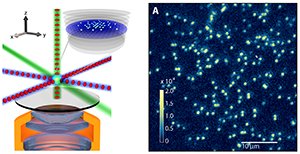Quantum emulation and control over single atoms
Area of expertise: Measurements & sensing at the quantum limit
Imagine a new generation of computers that dramatically surpasses the most powerful supercomputer on earth.
It would allow researchers to gain an understanding of presently intractable problems in materials science, quantum chemistry, high-energy physics, and even biology.
Physics Nobel Laureate Richard Feynman proposed such a device in the early 1980s:
Let the computer itself be built of quantum mechanical elements which obey quantum mechanical laws.
Such a quantum emulator would allow researchers to model and mimic systems that are prohibitively time-consuming even on the fastest supercomputer. We are now starting to realise this visionary approach in research laboratories and are learning how to build and understand these so-called 'quantum emulators'.
Complex systems in the form we could study with such devices are at the heart of materials science, chemistry, biology, and many other modern disciplines. Through our research, quantum emulators have the potential to enhance our knowledge of complex dynamics in a way that could be transformative for these fields and related technologies.
One example is to gain insight into the mechanism behind high-temperature superconductors, materials that can conduct electricity without losses at temperatures attained with liquid nitrogen. Our research could form a basis for developing room-temperature superconductors, which would be a tremendous technological advance. Other examples include the study of superconductivity in organic polymers or light-harvesting complexes in biological systems. Understanding such complexes will eventually have applications to future generations of solar energy devices.
World-leading theoretical & experimental research
At Strathclyde we have world-leading theoretical and experimental research in these directions.
In the groups of Professor Stefan Kuhr and Dr Elmar Haller, we have experiments where we can measure and control gases on single-atom level (as shown in the picture - every spot is a picture of a single atom), where for the first time this is available with a type of atoms that can directly model electrons in solid-state physics.
This is combined with leading theoretical expertise in this area, especially in the groups of Professor Andrew Daley and Dr Luca Tagliacozzo.
As a part of our research, we are leading a UK programme grant in designing out of equilibrium many-body quantum systems. Find out more: desoeq.phys.strath.ac.uk
Together with colleagues from the universities of Oxford and Cambridge, our vision is to use quantum emulators to explore, understand, and ultimately design forms of out-of-equilibrium quantum dynamics that underpin future quantum technologies and nanoelectronics.
